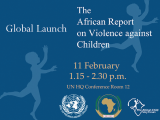- عربي
- 中文
- English
- Français
- Русский
- Español
New Report on Violence against Children in Africa calls for accelerated efforts across the continent to protect children from violence

New York, 11 February 2015 - A new report The African Report on Violence against Children was launched on 11th February at the United Nations in New York, in an event jointly organized by the African Union, the Office of the Special Representative of the UN Secretary General on Violence against Children, the Permanent Mission of Zambia and the African Child Policy Forum (ACPF).
The report, conducted by ACPF, reveals that despite the significant legal and policy measures undertaken in the region to protect children, African girls and boys are subjected to high levels of physical, sexual and emotional violence across all levels of society.
This comprehensive report is the first of its kind in the region and builds upon the commitment by African Union Member States to promote an Africa Fit for Children, stressed Marta Santos Pais, Special Representative of the UN Secretary General on Violence against Children.
It reviews the prevalence and magnitude of different forms of violence against children in different settings across the continent and contextualizes the recommendations of the 2006 United Nations Study on Violence against Children to the African reality.
“The responsibility of creating a continent where children live and grow-up in safety principally lies on the shoulders of Africans themselves. Yet, in an increasingly globalised world where violence is taking transnational dimensions, it takes a global compact to create a world free from violence,” stressed Mr Theophane Nikyema, Executive Director of ACPF.
The report acknowledges significant progress made in the African region. Most African states have ratified international and regional children’s rights instruments and many have put in place significant legislative and policy frameworks. Countries such as Angola and Ethiopia have made significant efforts to incorporate violence against children within their development agendas. Corporal punishment has been prohibited in Kenya, Tunisia, South Sudan and Togo. All African countries have legal provisions criminalising sexual violence, abuse and exploitation.
At the same time, reducing the level of violence against children has been constrained by weak implementation of laws and policies, under-resourced and under-staffed social services, and harmful practices that remain embedded in communities.
In support of the global process of follow-up to the 2006 UN Study, the African report recommends an agenda for action including:
Reinforcing national legal and policy frameworks to prohibit violence against children in all its forms and establishing clear prevention and response mechanisms, and strengthening the development of effective protection systems
Building and supporting effective national programmes and services to protect children from violence, including by increasing the capacity of children to prevent incidents of violence and become actors in the protection of themselves and their peers
Developing evidence-based advocacy strategies and implementing a pan-African campaign to change attitudes and behaviour that condone violence against children in African society
Ensuring co-ordination and synergy amongst national, pan-African and global actors. This is crucial for strengthening child protection systems that are comprehensive, well-coordinated and adequately resourced, built on indigenous and local capacities, and aligned with international standards.
In highlighting the golden opportunity that the Post 2015 sustainable development agenda presents, the Special Representative reiterated that “Freedom from violence is critical to achieving a sustainable future in which every child can grow up healthy, resilient, well-educated, culturally sensitive and effectively protected. Ensuring the protection of children from violence remains at the heart of the Post 2015 development agenda is crucial to safeguard children’s safety and development, to achieve social progress across all regions, and to build a world fit for all children.”
In her message on the occasion of the launch of the Report, Mme Sidikou Aissatou Alassane Moulaye, Chairperson of the African Committee of Experts on the Rights and Welfare of the Child, stated that children should be nurtured, provided with safer environments – in their homes, in schools, in workplaces, across society at all levels – where they can develop, grow and mature and reach their full potential. “It is our role as members the African Committee of Experts on the Rights and Welfare of the Child to ensure that African States work harder towards a continent fit for children”, she said.
To see the full report, click here

